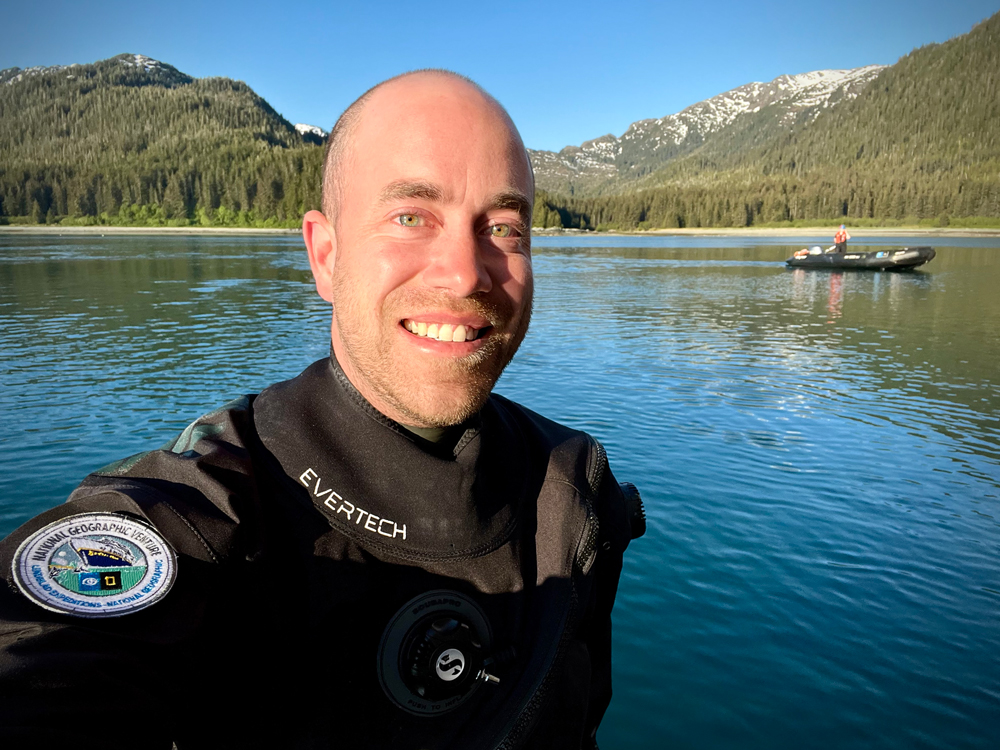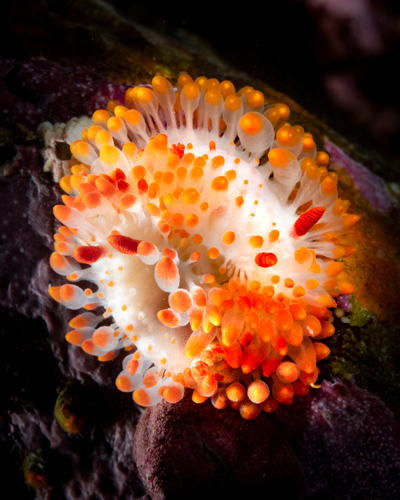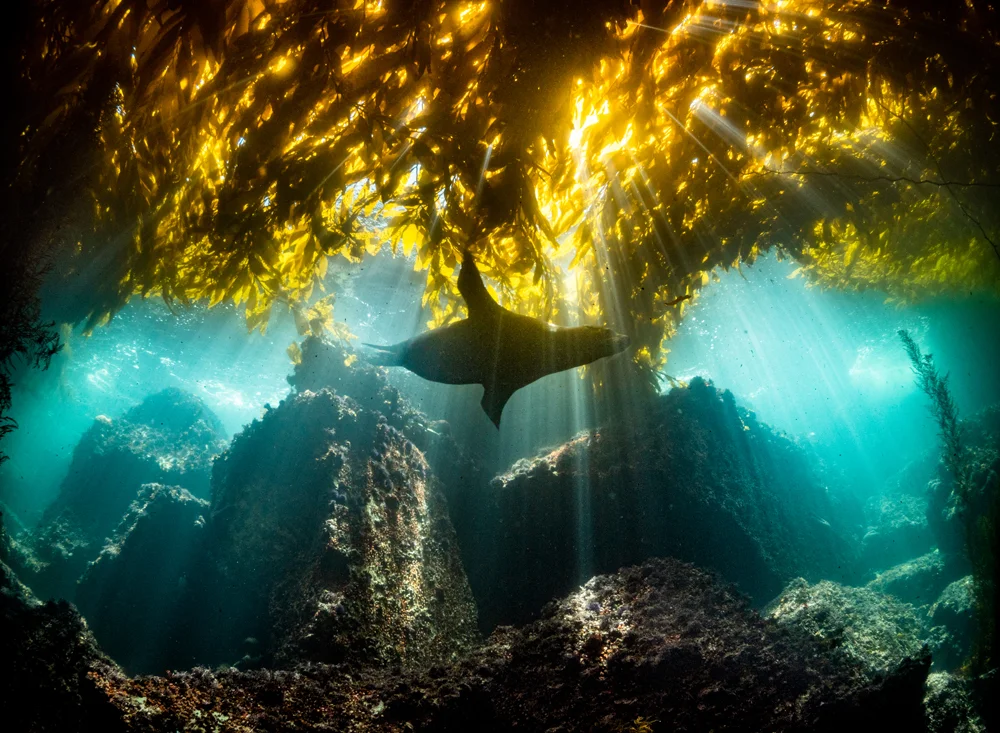
Global Dive Team - Patrick Webster
Patrick Webster
Location: Monterey Bay, California, USA
Occupation: Marine Science Communicator & Underwater Photographer
Scuba Diving Since: 2009.
Favorite Local Dive: Monastery Beach’s Kelp Kathedral
Favorite Dive Location: Gimme that coldwater!

An Interview with Patrick Webster
Why did you decide to take the giant stride into the oceans?
I knew I was going to try to spend my life with the ocean when I saw the sea otters at the Monterey Bay Aquarium when I was five years old. I remember watching them twirling, diving and blowing bubbles just behind the exhibit window and thinking “OK, whatever this is, I want to do that.” I followed that thought from grade school in the foothills of the French Alps to high school in the suburbs of Stockholm, Sweden—I was going to be a “marine biologist,” no matter and whatever that meant. When I finally settled from my childhood’s pelagic larval duration on the reefs of UC Santa Cruz’s marine science curriculum, I quickly discovered that mine was a very small view of what working with and for the ocean could be. Growing up far from the beach and without any divers in the family, it had honestly never occurred to me that I could be one of those people I’d seen exploring the ocean in those documentaries I’d watched religiously as a kid. Inspired by my peers and mentors I rushed through my Basic, Advanced and Rescue certs to enroll in UCSC’s scientific diving program, barely taking a moment to look around, frantically playing catch-up with my own ambitions. Midway through the sci-dive course, I did my first “fun dive”—no training, no sampling, no drills, just diving. Following my friends, I was guided to a pocket of pure kelp perfection, and I broke down in tears. The same feeling washed over me once again: “OK, whatever this is, I’m going to do that.” And ever since then, I’m trying to take as many strides as I can to share that feeling with the world above.
What kind of diving do you like to do?
I love exploring my Monterey Bay backyard—checking in on my favorite kelp plants, watching where familiar anemones have moved to, and watching the seasons change beneath the waves with the arrival and departure of ephemeral residents. I love meeting up with other bubble buds in the parking lot, manifesting dreams for the dive, then using my camera to interpret that snapshot in aquatic time, sharing stories and discoveries back at base over burritos and beverages. Sometimes it’s all about the micro critter hunt, others the charismatic megafauna, or maybe it’s the gelatinous drifters or another kelpy photoshoot. That freedom of exploration and expression in the home turf, vibing with where your mind and where the ocean are at on that given day—that’s my favorite kind of diving.
How has diving changed your life?
Without wanting to sound overly-dramatic, diving fundamentally restructured my perception of reality. I grew up in a very religious family, surrounded by people who had tapped into something deeper than themselves that they could turn to for guidance, comfort and inspiration. Tried as I might, I never felt what they did in the church—but I knew what it looked like to break through, to understand your connection to the All Of It and not be able to look back. I just couldn’t see what that could be, for me. You grow up learning that the ocean covers some 70+% of the planet’s surface, and that seems nice enough an anecdote to throw around during a land-based trivia night. What’s lost is that this ocean surface defines our planet to the Cosmos. If you were in the solar system, asking for directions to “Earth,” you’re likely to get lost in the space rocks. But if you ask for directions to “Ocean,” there’s only one place you’re headed. Ours is a water planet, the only one we know 100% for sure to have life on it, and so by default a self-referential search-image to probe deep space for potential company living on their own liquid world, somewhere in the stars. And the truth that is revealed as a diver is that the Ocean defines what it means to be an Earthling. Beneath the salty surface lies 99% of the available living space for Life to thrive—and it does! From surface to seafloor, the Ocean is made of life, of more kinds than exist on land, in far greater abundance and distribution. All life on land originated from the sea, and all life on land depends on the ocean to create the habitable spaceship we call home. The Ocean offers the promise to commune with the extraterrestrial, while establishing the baseline for our own self-realization. I first caught a glimpse of the world beyond my land-based self-centricity when I witnessed the sunken forest of the giant kelp’s water woods—a scene so alien and so familiar that it broke my brain and helped my eyes to see. Exploring the ocean and sharing its sea critts is where I feel that deep connection with the world around me and its people. I found my church in the kelp kathedral, and I feel compelled to bring as many people as I can find into its pieus.

Tell us about one of the most incredible underwater experiences you've ever had.
My favorite animals to see while diving are the “gelata”—jellyfishes, comb jellies, salps, pteropods, siphonophores, all those jiggly booger-beings made of weaponized water that are like the Ocean come alive. Because many of these animals are seasonal and at the mercy of current events, it’s always a treat when they get blown to the shore by wind and waves, to regale us with stories and colorful characters from the open ocean. And every so often, you get special visits from emissaries of the midwater community, those animals that live suspended in Inner Space, far from the surface and the seafloor. In Monterey Bay around February or so, there’s often a lull in the winter swells mixed with a light breeze that seems to sheer the surface and teleport what’s usually hidden in the depths to the nearshore, trapping the drifters in an eddie for a few days before the tides return them to their lairs. One such day occurred in the middle of the work week about 6 years ago—I was leaving a meeting when my phone rang with a frantic buddy saying breathlessly that I needed to get sick really quick and go take a dip. I looked over at my boss with that kinda look and she said “Long lunch?” and I nodded before leaving the office with burned rubber treads on the carpet. Half an hour later and I was swimming in the shallows of the Monterey Breakwater in a soup of gelatinous wonder. The water was filled with billions of larvaceans—tadpole-looking animals that create snot palaces to filter their food—each suspended in the water like zero-gravity snowflakes. Countless comb jellies flitted about, including the impressive swimming mouth Beroe forskalii, a massive ctenophore that prowls the water searching for prey to engulf. Further afield dancing hula-skirt siphonophores, briny pyrosome sea pickles, and fluttering sea butterflies filled the water column, all the while hungry egg-yolk jellies made like living flypaper to put a few of these drifters into a sticky situation. At the end of the dive, I was greeted by a Phronima sedentaria pram-bug salp-killing amphipod, the lovely crustacean lady having hollowed out her host and laid her eggs inside its husk as she swam furiously to funnel more food into the former thaliacean. I’d only ever seen these on deep-sea ROV footage, and now here it was in front of me, just beyond the beach that I’d explored hundreds of times before. It was such a treat, and a testament to the wonders that the Ocean provides if you’re in the right place at the right time—and with the right supervisor who gets that sometimes, the Ocean’s magnetism is too much to overcome. Shootout to that Jellypalooza, may I be able to attend again someday soon!
What are some of your favorite places underwater?
Besides the home kelp forests, I’ve enjoyed those few times I’ve been fortunate enough to travel somewhere subtropical to enjoy a bit less neoprene and bit more (reef-safe) sunscreen than I typically employ. The incredible abundance of life in Cabo Pulmo, Baja California Sur has kept me coming back again and again to watch as Her Deepness’s Hope Spot recovers from its overfished past and rekindles the legacy of the Gulf of California as Cousteau’s “Aquarium of the World.” The critters of Lembeh Strait in Indonesia still get me giddy when I think about the awesome adaptability of animals living hidden in plain sight on the volcanic muck. And more recently, the pelagic magic of Kona’s blackwater diving live rent-free in my mind’s eye—suspended in the void, watching the darkness swallow your light as trillions of animals migrate to the surface to feed in our planet’s largest animal migration, each speck of organic dust flowing by you like stars in hyperspace offering the opportunity to meet a new lifeform… And I’m sure there are many more places that will be my favorites soon!
What is your advice to someone considering diving?
Oh wow, well first of all, right on!! It’s a big step for any air-breathing land-being to take that giant stride into the Big Blue. Knowing that you could be a diver is the first step—from then on, it’s all about taking it slow and steady, one fin-kick at a time. It can be overwhelming at times, the theories and the gear and the training, and you’ll be pushing yourself into unknown territory on the regular. That’s part of the fun, but it should always remain fun, even through the challenges. One of the most important things for my own dive career has been having a general comfort in the water. Before I started diving I had learned how to surf—understanding how waves work, where the power is and where you can be to avoid it, and especially seeing what an angry ocean looks like, that all helped me feel comfortable when it came time to walk out with SCUBA gear in tow. If you’re able to, try sailing, fishing, freediving, surfing, swimming, or anything that puts you in the water really—knowing how the ocean works and how you can work with it will help in all things SCUBA later on. And once you start diving, listen to yourself about how you’re feeling, and your intentions. It’s easy to overcomplicate things—and as an underwater photographer, I know first-hand how easy it is to tie your “performance” with your enjoyment of a dive. Before I get in the water, I try as best as I can to free myself of expectations, and to remind myself that what I’m about to do is incredibly new to the human experience. We’ve only been able to explore beneath the waves as we do for less than 100 years, much less with the comfort and safety that modern gear provides. Do what it is that makes you happy, and what puts you in the best position to have the experiences that are meaningful to you, not just want the “cool kids” are doing. It’s great to be inspired by others, but diving is a deeply personal endeavor, and we need all eyes, minds and experiences to look at the world beneath the waves to share it with their communities. Once the ocean takes hold, go with its flow and you’ll find what you’re looking for. “Aim for the moon jellies and you’ll land among the sea stars” or something like that.
What would you tell people about the oceans?
I suppose if you look at the length of the response to this interview, I suppose the better question is what wouldn’t I tell people about the oceans! But more sea-riously, I would tell them that the Ocean is a central part of their life, whether that’s believable or not on any given day. The air you breathe, the water you drink and the food you eat is tied to the Ocean and its climate-controlling, life-sustaining roles as the blue heart of our planet’s life-support system. And that the Ocean is full of wonder, of life-forms that can hardly be believed and yet who live secretly in our aquatic backyards disguised by the invisibility cloak of the sea surface. And I would tell them that the Ocean can be beautiful even if it’s sick, that it can inspire even as it struggles, that it can move you even as it slows down. We’ve robbed ourselves of many of its riches before those of us alive today could witness it, and that our baseline for wonder is at the same time the shadow of its former self. And I would tell them that we can fix it! And that in some places, we’ve done it! All that’s required is for us to have a sea change of heart, to mend our relationships with our slices of Ocean and allow them to recover, to just Be. Where we have done so, the Ocean rebounds and can welcome Explorers and Neighbors again where Plunderers once roamed. We can leave a better blue world for ourselves and our descendants, and all it takes is to consider how valuable the Ocean is, and not what it can be mined for value.

What does diving mean to you?
Diving is a bubbly path toward self-realization and a deeper understanding of what it means to live on this very special blue mote of dust suspended in a sunbeam. It’s a moving meditation through the Inner Space of Planet Ocean. It’s an activity that makes you confront your meaty vessel and its various idiosyncrasies—you’ll spit, you’ll pee, you’ll puke, and you’ll be confronted with the most meaningful experiences and relationships of your life. Oh and it’s a lot of fun!
What's your favorite thing in your dive bag?
I wouldn’t be able to have the experiences that I have had underwater if it weren’t for the life-support equipment of my SCUBA gear. I’ve been using SCUBAPRO regulators and fins since I started diving—first the on-sale rental MK11 kit that could fit my student budget, followed by the classic G250 and JET FINS that fit my working-for-environmental-non-profits budget, and now the fresh kit that SCUBAPRO is supporting my professional diver dreams with. To go into the ocean with the peace of mind and confidence that the gear will match my aspirations is an integral part of a successful dive career, and I’m proud to say that SCUBAPRO has been there since day one. Right now, my Evertech Drysuit is blowing my mind for how lightweight and comfortable an off-the-shelf drysuit can be. It’s already giving me the confidence to explore the polar waters I have plans to dive into in the near future. Thanks to the whole team at SCUBAPRO for equipping me and so many others to follow their aquatic dreams!
Follow Patrick on Social Media:
Instagram- @underwaterpat
Tik Tok- @underwaterpat





